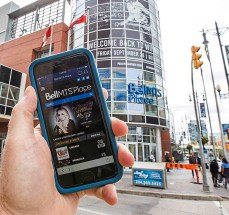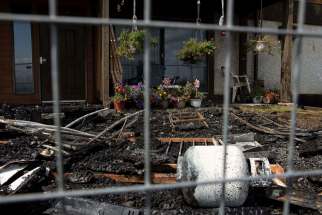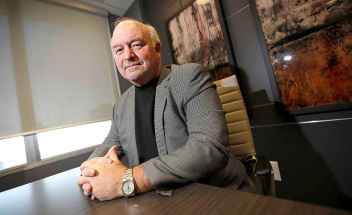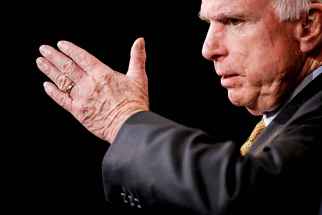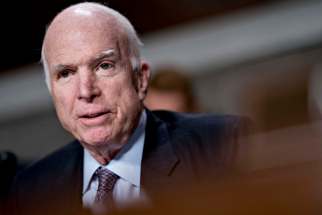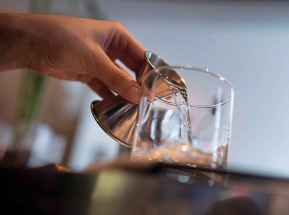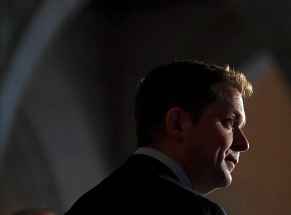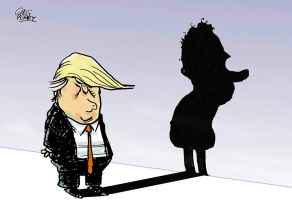None for the road Teetotalers have many reasons why they don't drink — they just wish they weren't always asked for them
Read this article for free:
or
Already have an account? Log in here »
To continue reading, please subscribe:
Monthly Digital Subscription
$0 for the first 4 weeks*
- Enjoy unlimited reading on winnipegfreepress.com
- Read the E-Edition, our digital replica newspaper
- Access News Break, our award-winning app
- Play interactive puzzles
*No charge for 4 weeks then price increases to the regular rate of $19.00 plus GST every four weeks. Offer available to new and qualified returning subscribers only. Cancel any time.
Monthly Digital Subscription
$4.75/week*
- Enjoy unlimited reading on winnipegfreepress.com
- Read the E-Edition, our digital replica newspaper
- Access News Break, our award-winning app
- Play interactive puzzles
*Billed as $19 plus GST every four weeks. Cancel any time.
To continue reading, please subscribe:
Add Free Press access to your Brandon Sun subscription for only an additional
$1 for the first 4 weeks*
*Your next subscription payment will increase by $1.00 and you will be charged $16.99 plus GST for four weeks. After four weeks, your payment will increase to $23.99 plus GST every four weeks.
Read unlimited articles for free today:
or
Already have an account? Log in here »
Hey there, time traveller!
This article was published 27/08/2018 (2661 days ago), so information in it may no longer be current.
Beer at a baseball game, cocktails after work, champagne on New Year’s Eve — alcohol is often part of our social fabric. We drink to celebrate and commiserate, to bond and network, to relax and unwind.
And sometimes, we drink to escape and self-medicate. Sometimes, we drink too much.
Despite the growing awareness on the deleterious health effects of heavy alcohol use, drinking culture seems as ubiquitous as ever. From “mommy juice” to “rosé all day,” it seems like it’s always wine o’clock everywhere.
But there is a growing segment of people who are pushing back against our boozy culture. They are cutting back, or quitting completely. They are participating in Dry January and Sober October challenges, and getting involved in the “Mindful Drinking” movement.
They are not necessarily alcoholics, either. Rather, they are people who are examining — and, in some cases, radically redefining — their personal relationships with drinking.
● ● ●
When Svitlana Maluzynsky was in her 20s, she was around booze all the time. She worked in liquor promotions, which brought her to beer vendors, Liquor Marts and bars all over the city. In the summer, she volunteered as a bartender at the Folklorama’s Ukrainian Pavilion.
But she was rarely the one imbibing. Maluzynsky, now 32, hasn’t had a drink in a decade.
“I never liked it,” she says, simply. “I couldn’t handle beer ever — it made me super sick. I just didn’t get the appeal.”
Still, she continued to work in liquor promotions throughout university. She liked the social aspect.
“I still thought it was fun, I just didn’t want do it myself,” she says. “I just wanted to make people happy.
“If other people want to drink, I don’t have a problem with that, so long as they’re being responsible. That’s my big thing: they made the choice to drink, and anything they do is their responsibility.”
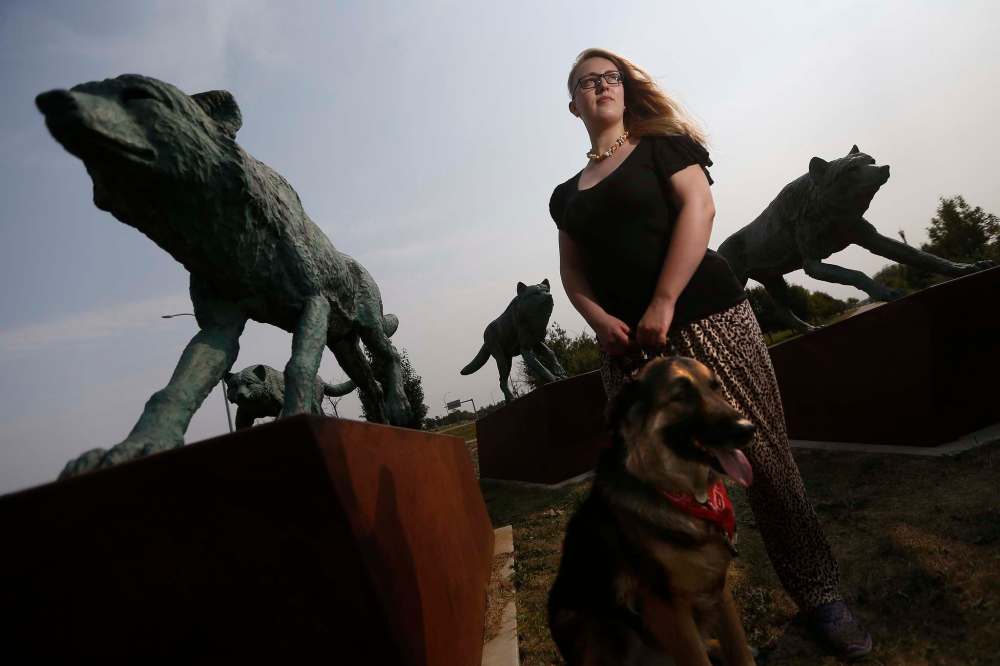
As someone who is both sober and vegan, Maluzynsky is used to rejecting dominant cultural norms.
“I think of ‘Rosé All Day’ — like slogans that are really pretty and cute, and you can even find them on T-shirts,” she says. “I think it helps to be vegan; like, the bacon obsession, I don’t participate in it. I’ve just categorized it as things that aren’t for me.”
That said, Maluzynsky is not an outlier in her peer group. Many of her friends also don’t drink. Her partner, Jason, has never drank. When they got married last year, their wedding “was completely dry — and also vegan,” she says. No one complained. Everyone had a good time.
There’s growing research to suggest that millennials (born between 1981 and 1996), and Generation Z (born after 1996) are increasingly choosing to go sober — most strikingly in the United Kingdom, where more than a quarter of young adults aged 16 to 24 do not drink alcohol.
Maluzynsky is part of the millennial generation; she suspects that job insecurity and the rise of the gig economy might be a contributing factor.
“The people I graduated with are struggling to find work, and I know that’s true for a lot of millennials,” says Maluzynsky, who recently completed her masters degree in library and information science.
“They’re either unemployed or underemployed. If there are things they can cut out of their budget, alcohol is going to be up there. That might have a lot to do with why that age group isn’t drinking as much.”
● ● ●
Married couple Holly Poklitar, 34, and Blaine Martinson, 39, didn’t quit drinking. They never started.
They are teetotal, a lifestyle that predated their marriage. It was one of many things they happened to have in common when they met.
Martinson has never had alcohol; Poklitar had an accidental swig of beer once at a karaoke night, after picking up the wrong glass. She spit it out.
Poklitar doesn’t come from a family of heavy drinkers. It was more of a personal decision. “I never wanted to consume anything that would impact my state of mind,” she says. “I wanted to be on the ball.”
Martinson, meanwhile, has witnessed first-hand the damage alcohol can do. “I didn’t grow up with a positive association with alcohol — it wasn’t associated with fun times or good times,” he says. “So I made a promise to myself as a kid that I was never going to drink.”
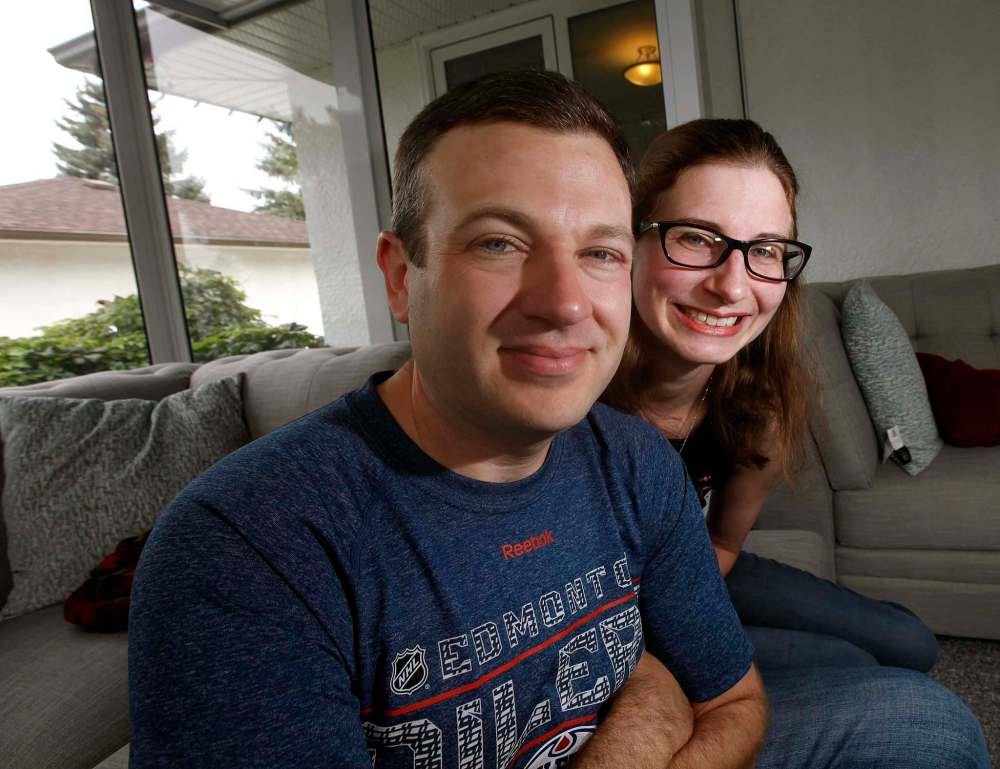
Poklitar says she doesn’t feel pressured to drink by anyone in her life.
“Because I’ve never drank, it’s never been a problem. No one has hassled me about it. I’ve always been around people drinking. I’ve bought alcohol as gifts. We had a wedding social and an open bar at the wedding.”
“No one has tried to goad me into drinking,” Martinson says. “But that being said, when you’re hanging out with people and everyone seems to be having a really good time and I’m not — you wonder. You think, ‘Am I missing out?’ I’m not going to say I’ve never been tempted.”
Martinson says that he does feel a sense of social exclusion.
“As a male approaching middle age, it’s what people do. It’s a social lubricant, it’s what you do after work with co-workers. When you’re not drinking, the other person feels like they shouldn’t either — and you lose that connection.”“My tolerance and acceptance of drinking culture is getting lower as I get older.”–Blaine Martinson
He points to the craft beer boom as an example. “It’s a thing that bonds a lot of people as an interest, an activity, and a hobby,” he says. “But it’s all booze, really.”
Poklitar also believes that people are drinking more, not less. “I share some articles about the health concerns, and I keep it to myself mainly — but I do get concerned when I see people drink to excess,” she says.
Like Poklitar, Martinson doesn’t evangelize the teetotal lifestyle — nor do they advocate for prohibition. But he’s also finding he doesn’t really want to be around people who have been drinking a lot.
“My tolerance and acceptance of drinking culture is getting lower as I get older.”
● ● ●
It started out as a Dry January. Then it was a three-month challenge. And then, Jen Fritz, 46, decided to make 2017 the year of no booze.
The Vancouver-based PR professional is not an alcoholic, nor was she ever a big drinker. Her foray into sobriety came from an epiphany.
“It really came from me realizing that I wasn’t seeing the benefit of drinking,” she says. “Like, there’s no benefit to drinking. I don’t understand the payoff. I’m basically paying to feel like shit.”
Quitting drinking has made her feel better, physically and mentally. “It also really opened my eyes to how every social situation revolves around alcohol, and how normalized that behaviour is — and how normalized the marketing is too,” she says.
“And I was part of it, too — like ‘let’s have a book club and drink our wine, ladies!’ But I think when you’re not drinking anymore, you become hyper-aware of it. We just all do this, and we all accept it. But why?”“I hate that I’m always coming up with a reason for not drinking. The minute you say you don’t drink, they assume you’re an alcoholic.”–Jen Fritz
Her year of sobriety had its challenges, but it also had many rewards. “I did all the things I did when I did drink, and I still had fun,” she says. “In fact, I enjoyed things even more because I was more engaged. You realize the lie: that booze creates fun.”
Cutting out booze also made her realize how much she was using alcohol as a coping mechanism for stress and anxiety. “I had to look for other ways,” she says.
Still, managing other people’s assumptions about her sobriety remains an issue. Fritz is part of a generation, and an industry, in which people are still expected to provide a reason — pregnant, driving, antidepressants, recovery — for not drinking. “I don’t drink because I don’t want to” is still met with incredulity.
“I feel like I’m always explaining myself,” she says. “I hate that I’m always coming up with a reason for not drinking. The minute you say you don’t drink, they assume you’re an alcoholic.” Her go-to phrase these days is, “I don’t need it,” which usually shuts the door on the topic. “Their own relationship with alcohol dictates how comfortable they are with it,” she notes.
Now, Fritz says she’s “sober-ish.” When the calendar flipped to 2018, she had a few drinks on a vacation and some wine on her birthday, but she discovered she preferred not drinking.
“You feel disconnected when you’re the only person not drinking,” she acknowledges. “But I don’t like it, and I don’t want to do it.”
● ● ●
“Alcohol is accepted until it’s a problem — and then it’s stigmatized.”
That’s Winnipeg musician Rusty Matyas (Imaginary Cities, the Weakerthans, the Sheepdogs) who, as of now, is four months sober.
“I think I knew I had a problem with it for years,” he says. “I considered myself a functioning alcoholic.”
Recovery is part of this story, too. Alcohol abuse does not develop overnight, nor does it always look how we expect it to. And in a culture in which drinking is normalized, problem drinking can be difficult to detect — in oneself and in others.
“It’s really easy to slide past that breaking point,” he says.
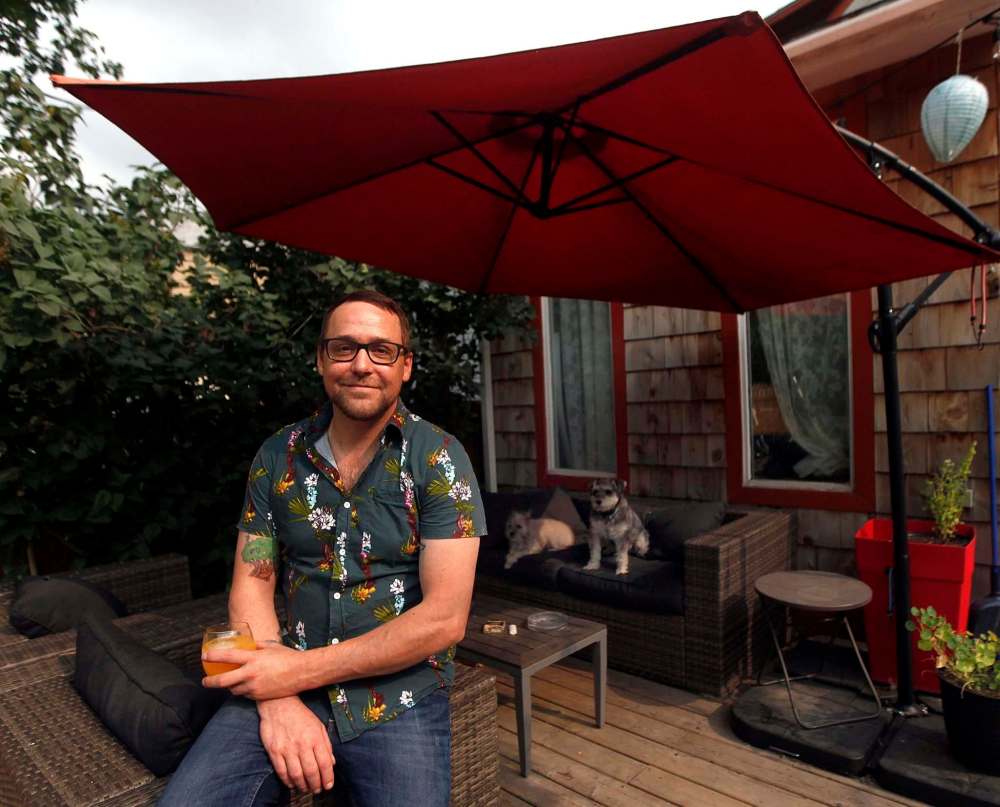
For Matyas, 38, drinking was how he coped with stage anxiety. “I’d drink to get comfortable,” he says. “I had a system: if the opening band was ‘x’ number of songs into their set, that’s when I’d start drinking. And it got earlier and earlier.”
Seeing a musician drink onstage isn’t exactly an anomaly, especially when so many stages are sponsored by beer or liquor companies.
“It’s considered part of the job. You go see a band and they’re having a beer onstage and it’s like, ‘They’re one of us.’ It’s promoted.
“I find it interesting that something that is quite literally poison has been normalized. It’s the punchline of every joke on TV — ‘Get this guy a drink.’ But underneath, there is this tiny elephant in the room. Like, “ha ha, that’s funny…?’ “
In the last few years, Matyas’ health worsened. He started noticing gaps in his memory. In December, he went to the emergency room after vomiting blood. And then, in the spring, he decided to get help.“I realized I wasn’t really missing out on anything by not drinking.”–Rusty Matyas
“The early stages of sobriety — especially a case like my own where I was very much an alcoholic who needed help — is really hard,” he says. “There’s the mental and physical withdrawal. There’s a lot of fear of missing out, which is a big deterrent for people (to quit), to be honest.
“Everywhere you go, it’s part of the evening. Even having a nice dinner, you have a glass of wine. And lots of people can do that. And I can’t, because I’ll have all the wine.
“I don’t want to stigmatize drinking for people who do it responsibly,” he adds. “But I think destigmatizing people who need to be sober, for whatever reason, is important.”
Now, he says, he’s in the early stages of learning how to live as a sober person. He’s eating better, and has more energy and drive. He’s happier and more productive. The Tree of Life is now emblazoned on his bicep, a reminder of all the reasons not to drink.
“I realized I wasn’t really missing out on anything by not drinking,” he says. “What I was missing out on was my life.”
jen.zoratti@freepress.mb.ca Twitter: @JenZoratti

Jen Zoratti is a Winnipeg Free Press columnist and author of the newsletter, NEXT, a weekly look towards a post-pandemic future.
Our newsroom depends on a growing audience of readers to power our journalism. If you are not a paid reader, please consider becoming a subscriber.
Our newsroom depends on its audience of readers to power our journalism. Thank you for your support.

